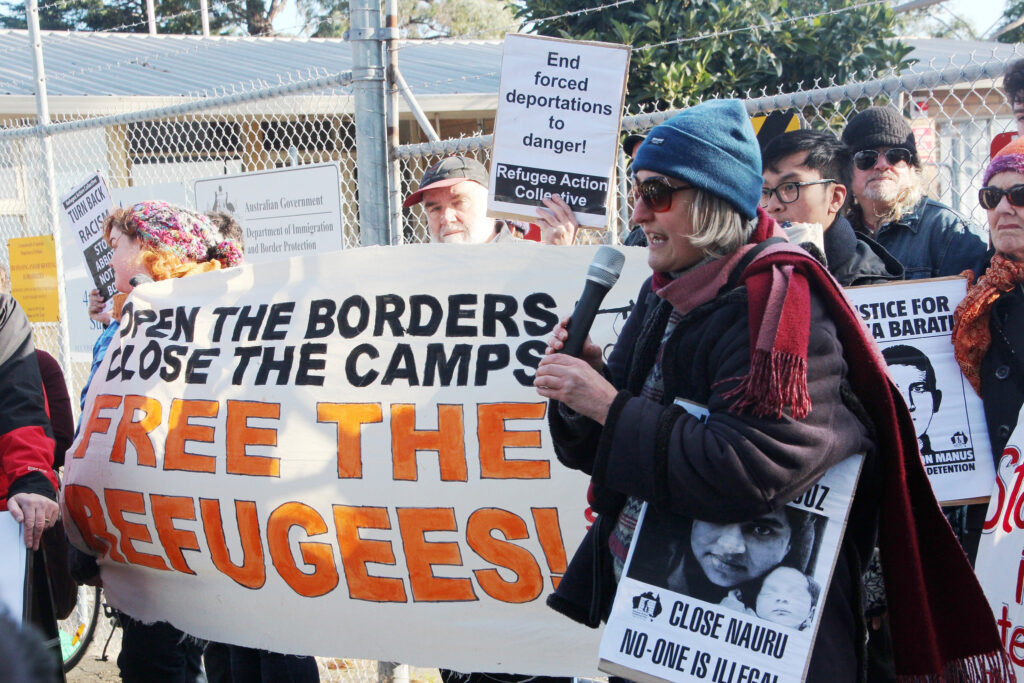By Mane Berikyan and Molly Miller
LOS ANGELES — In nearly every humanitarian crisis of the 21st century, realpolitik rears its ugly head.
Although the state of human rights is on a downward trajectory globally, “human rights” and “democracy” remain favorite catchphrases in Western foreign policy, yielded as political tools that serve to further countries’ geopolitical interests abroad.
The work of human rights defenders and civil society activists, therefore, becomes all the more critical, and gives a voice to those most vulnerable to the plights of our increasingly globalized world
Through no fault of its dedicated agents, the human rights framework today is deeply flawed and in dire need for reform. Though both its strengths and weaknesses are numerous, two factors stand out as emblems of the framework’s ineffectiveness — namely, its inherent political neutrality and the implementation of economic sanctions.
Political Neutrality
The field of human rights tackles some of the most contentious, critical crises of our time. In the pursuit for justice, peace and universal rights, the human rights framework is rooted in a promise to maintain political neutrality that is fundamental to its structure. Today, civil society operates on a backbone of non-governmental, apolitical and non-partisan organizations that, in most countries, are subject to certain commitments to remain politically neutral in order to register and carry out their work.
The innate political neutrality of human rights work is, in most ways, justified. Foreign organizations and local human rights groups are often faced with repressive, harsh conditions when conducting humanitarian missions in authoritarian and non-democratic countries like Belarus or Azerbaijan. In many of these extreme cases, their operations are strictly limited, outright prohibited or targeted in crackdowns, with human rights activists subjected to exile, imprisonment or violence.
To carry out their critical work under such conditions, compliance with the government and local authorities and distance from political issues is key to protecting activists, the victims of human rights violations and ongoing operations of the organization. Political neutrality ensures that human rights activists can work with a wide array of people, unhindered by political complexities and with the sole purpose of humanitarianism.
Of course, operating under the condition of political neutrality does not make human rights advocacy unprincipled. Commitments to universal human rights are values shared and upheld by those carrying out human rights work globally. The problem, then, arises not when political neutrality facilitates this work, but when it becomes counterproductive.
At the heart of some of the most relevant humanitarian crises lies political and historical injustice. Politics is so deeply intertwined with war and armed conflict, one of the most devastating forces jeopardizing global rights, that remaining impartial is done so at the cost of already ravaged, war-torn communities.
In the famous words of the recently departed Desmond Tutu, “If you are neutral in situations of injustice, you have chosen the side of the oppressor.” Reverend Tutu’s words ring especially true in cases like Nagorno-Karabakh and Palestine, where human rights advocacy is often stifled by more powerful political forces at play.
Delving into one of these examples, the 2020 Nagorno-Karabakh War saw a violent, bloody conflict unlike any of its kind in the 21st century. Thousands of soldiers were left dead, hundreds of thousands of civilians displaced and whole cities destroyed. The still-unresolved conflict involved a small, fragile democracy whose future held promising prospects for the West faced with an oil-rich, corrupt dictatorship where freedom of expression and civil society are ruthlessly suppressed. Ethnic Armenians make up an overwhelming majority of the population in Nagorno-Karabakh and therefore bore the brunt of the casualties.
Yet, human rights organizations like Amnesty International and Human Rights Watch maintained firm positions of neutrality, opting to characterize the conflict as completely two-sided, ergo contributing to the narrative pushed by Azerbaijan. Although human rights violations were committed by “both sides” (a favorite phrase of Western news media in the coverage of Nagorno-Karabakh), the crimes of the Armenian and Azerbaijani forces are incomparable in scale when the impact of war was disproportionately absorbed by the Armenian civilians as the region was effectively ethnically cleansed. Despite Azerbaijani efforts to prevent foreign journalists from documenting the war, monitoring by human rights groups took place — though its outcomes and neutral reporting ultimately failed to capture the extent of abuses endured by victims of the war.
The time has come to revisit the political neutrality that is inherently embedded in the contemporary human rights framework. When political injustice becomes the main violator of human rights, the structures in place must have the flexibility to adapt and meet these challenges, addressing abuse at the root rather than being limited by commitments to absolute neutrality. The need for nuance, subjectivity and sensitivity is essential when at the core of humanitarianism lies humanity. Politics will not untangle itself from conflict to make room for human rights.
Because when oppression and injustice are met with neutrality, this vicious cycle is left unbroken and undisturbed, free to wreak havoc on the vulnerable.
Economic Sanctions
Economic sanctions are the primary tool used to address human rights abuses. The United Nations Security Council (UNSC) has authorized sanctions 30 times since 1966. Sanctions are also frequently enacted unilaterally, with the United States authorizing sanctions as recently as December 10 of last year.
Classical perspectives on this issue hold that sanctions are often effective at achieving the goals of the sanctioning actor. However, this perspective does not address the bigger picture. In order to evaluate the success of economic sanctions, we need to not look at just whether the initial goal was achieved. Rather, we must also look at whether humanitarian conditions actually improved as a whole.
Past evidence shows that the sanctions’ record on holistically improving humanitarian conditions is at best mixed. Two examples clearly illustrate the pitfalls of using economic sanctions to improve humanitarian conditions: U.S. sanctions against Cuba since 1962 and more recent sanctions on Venezuela.
With some fluctuations in rules, the United States has banned virtually all exports to Cuba since 1962, and has sanctioned others who have violated this unilateral embargo. The goal of ending the oppressive regime in Cuba is admirable. However, this embargo has created significantly more harm than benefits to humanitarian objectives.
It first ought to be recognized that economic sanctions against Cuba have not achieved their objectives. The Communist Party of Cuba is still in power, and liberalization has been made only in half-steps. In fact, there is substantial evidence to show that the embargo of Cuba has only strengthened the Communist Party of Cuba’s grip on power, with former and current leaders of Cuba leveraging the embargo to vilify the United States and distract from domestic abuses.
Beyond the embargo’s ineffectiveness, it has actively harmed the livelihood of the Cuban people. The UN estimates place the cost to Cuba at almost $130 billion since the embargo started, with the vast majority of this cost being borne by the Cuban public. This situation has been exacerbated by the COVID-19 pandemic, with Cuba being unable to import needed medical supplies.
While the United States’ embargo of Cuba may be the most enduring example of the humanitarian failures of sanctions, none is as dramatic as the recent failures in Venezuela.
Since the Venezuelan crisis began in 2010, the United States and other countries have placed large-scale sanctions on the Venezuelan economy. Most consequentially, Venezuelan petroleum exports have been embargoed and Venezuelans are no longer able to access global banking institutions. These sanctions are intended to place pressure on the regime of Nicolás Maduro to cede power to Juan Guaidó.
Yet again, these sanctions have not achieved their goals, and have only furthered the economic and humanitarian struggles which Venezuela is facing. The alimentary crisis in Venezuela has deepened since sanctions have expanded, with Venezuela being largely unable to import food. The actions of humanitarian organizations have been curtailed, as they are unable to access foreign finances while working in Venezuela. Further, sanctions on Venezuela have actually served to restrict free enterprise. By limiting access to international financial institutions, sanctions on Venezuela have made it impossible for new businesses to formally establish themselves.
Recognition of the harms of economic sanctions is growing. Recently, UN High Commissioner for Human Rights Michelle Bachelet has called for a “reevaluation” of economic sanctions to ensure that they do not compound human rights violations. However, when the tool used to stop human rights violations only makes them worse, it is very clear that we need a far more effective enforcement mechanism.
Conclusion
The pursuit of human rights is admirable. Human rights frameworks are widely agreed upon and serve to provide international mechanisms to uphold them when states cannot. However, it is clear that these mechanisms have failed.
In outsourcing human rights enforcement to non-governmental organizations which lack the power or will to condemn human rights violators, states have made it impossible to place the needed pressure in order to stop these human rights violations. When states do pursue their own, non-politically neutral actions, they often make the humanitarian condition on the ground worse not better. States need to reconsider their approach to protecting human rights in order to truly meet their commitments to humanitarian endeavors.
When faced with human rights crises, states need to move beyond past models of political neutrality and economic sanctions. The first step is acknowledging that political neutrality cannot always account for the situation on the ground. Recounting the truth of a situation does not constitute taking a “politically motivated” side. When engaging in humanitarian action, states need to address the facts of the situation, regardless of their political convenience.
Further, sanctions should not take the place of exerting soft power and providing aid. Using soft power to influence others not only avoids the harms of economic sanctions, but helps provide legitimacy to those acting to stop humanitarian crises. Further, providing aid is truly the only way to improve the situation on the ground. Fears of aid being misappropriated are largely misguided. Aid need not only be provisioned by states; NGOs can also help to fill in the gaps, further ensuring that it is sensitive to the needs of the communities which it is going to.
An ineffective human rights framework is a broken one. The time for reform is now.





